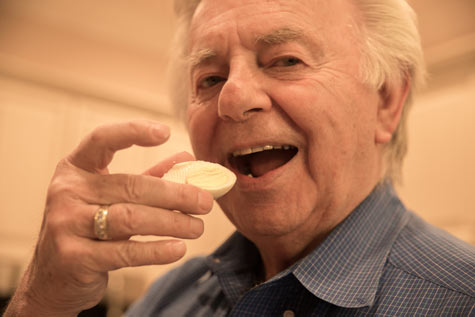
Meeting daily protein requirements for seniors helps to build muscle strength and strong bones.
Pass the cheese, please! Recent scientific studies are showing the benefits of a protein-rich diet for the elderly, particularly during occasions of anxiety, for example, when battling a chronic disease or acute illness, or preparing for a surgical treatment or hospitalization, when protein is processed less effectively. And even when healthy, meeting daily protein requirements for seniors is paramount to building muscle strength and mass, healthy bones and more.
However, around 1/3 of all seniors aren’t eating adequate levels of protein, for many reasons, which can include:
- Taste impairments
- Difficulties with swallowing
- Financial constraints
- Reduced appetite
- Dental issues
And, the less active lifestyle that a number of older adults lead further compounds the adverse effects of too little protein intake, including:
- Worsening mobility
- Reduced muscle mass and strength
- Extended recovery times when ill
- Eventual loss of independence
The good thing is, seniors who do meet daily protein requirements are more inclined to continue to maintain independent functionality with tasks including getting dressed and caring for other personal hygiene needs, walking, and climbing stairs. As stated by Wayne Campbell, professor of nutrition science at Purdue University, “While eating an adequate amount of protein is not going to prevent age-associated loss of muscle altogether, not eating enough protein can be an exacerbating factor that causes older adults to lose muscle faster.”
The studies report that protein ought to be obtained from natural food sources, rather than through protein shakes. Recommended protein levels are typically .8 grams of protein per 2.2 pounds of body weight every day; so, for a 120-pound woman, that equates to 48 grams of protein/day. However, for those individuals being confronted with the stressors mentioned previously, the guideline grows to 1.2 – 1.5 grams of protein per 2.2 pounds of body weight.
These protein-rich foods are great options:
- Chicken (28 grams of protein per 3-ounce serving)
- Yogurt (18 grams of protein per 6-ounce serving)
- Cottage cheese (14 grams of protein per ½-cup serving)
- Lentils (9 grams of protein per cup)
- Milk (8 grams of protein per cup)
Naturally, be sure to check with the older adult’s health care provider prior to making any dietary modifications. Once a dietary plan is agreed upon, let Home With You Senior Care help by planning and cooking nutritious, delicious meals, picking up groceries and guaranteeing the pantry and fridge are stocked with wholesome meal and snack options, offering encouragement to maintain an active lifestyle, and so much more – all adding to improved overall health.
Email or call us any time at 410-756-0959 to request a free in-home consultation with our expert care team to learn more about our top-rated home care in Baltimore, MD and the surrounding areas.
